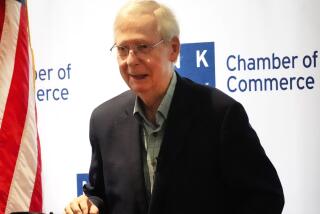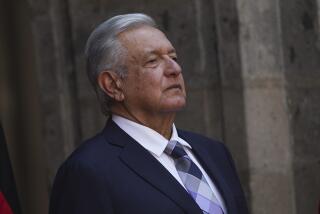All Quiet on the Castro Front
- Share via
GUANTANAMO BAY, Cuba — Neither Fidel Castro nor the brother he has designated as acting president appeared in public or the media Wednesday, deepening a prevailing impression that the 79-year-old revolutionary is wrestling with the most severe health crisis of his life.
The official Communist Party newspaper Granma reiterated on its front page and website that Castro was in stable condition after undergoing surgery to stem intestinal bleeding. The head of Cuba’s parliament, National Assembly President Ricardo Alarcon, who said he had talked with Castro for half an hour Tuesday, said on two U.S.-based radio programs that the Cuban leader was “very alive and very alert” but would need several weeks to recuperate.
Granma’s full text of a statement read on national television Tuesday quoted Castro as saying he was in good spirits but that details of his health constituted “a state secret.” Castro’s characterizations of his condition seemed intent on discouraging expectations that he would soon return to power.
Castro, who turns 80 next week, has experienced numerous illnesses, accidents, assassination attempts and dangerous encounters, always emerging after long public absences appearing fit and full of the fight that brought his leftist guerrilla movement to power more than 47 years ago.
Although little is known about his illness, it has been described in statements attributed to Castro as “an acute intestinal crisis with sustained bleeding” that may have been brought on by stress and a demanding travel schedule. He flew to Argentina last month and met with fellow leftist leaders at the Mercosur trade talks, then led anniversary celebrations of the July 26, 1953, assault on the Moncada military barracks near Santiago de Cuba, the first battle of his revolution.
Alarcon, a former U.N. ambassador, told the New York-based Democracy Now radio program by phone from Havana that Castro’s surgery was complicated.
“He is forced to have a period of rest. He underwent complicated surgery. He’s in, I would say, a normal period of recovery after an important surgery,” Alarcon said.
“I would say that he is doing fairly well,” he said, then added, “I don’t want to diminish the seriousness of the situation.... He needs a lot of care and attention.”
It remained unclear Wednesday why Raul Castro, the leader’s brother and designated successor, had yet to address the Cuban people since taking command of the military, government and Communist Party late Monday.
Raul Castro has long been in his brother’s shadow, but much fanfare surrounded his 75th birthday in June. Cuba watchers interpreted the unusual attention as confirmation that the longtime No. 2 was indeed being groomed to succeed his brother.
A slightly stepped-up police presence was noticed in Havana on Wednesday, and strollers along the seaside Malecon and the narrow cobblestone streets of Old Town seemed disinclined to engage in idle chat about the political moves underway.
Cubans taking part in officially sanctioned rallies in support of Fidel Castro, such as one by railway workers in Havana, were quoted by Granma as disparaging U.S. designs for a democratic transition in Cuba.
Crane operator Edilberto Ferrer was quoted as vowing that “this country will never have a transition to capitalism.”
In Washington, White House spokesman Tony Snow urged Cubans on both sides of the Florida Straits to refrain from taking to the seas to migrate.
Snow said it was difficult for U.S. authorities to assess the situation in Cuba because Castro presided over “a closed society,” but noted it was “important at this juncture to tell people to stay where you are. This is not a time for people to be getting in the water and going either way.”
*
A special correspondent in Havana contributed to this report.
More to Read
Sign up for Essential California
The most important California stories and recommendations in your inbox every morning.
You may occasionally receive promotional content from the Los Angeles Times.











